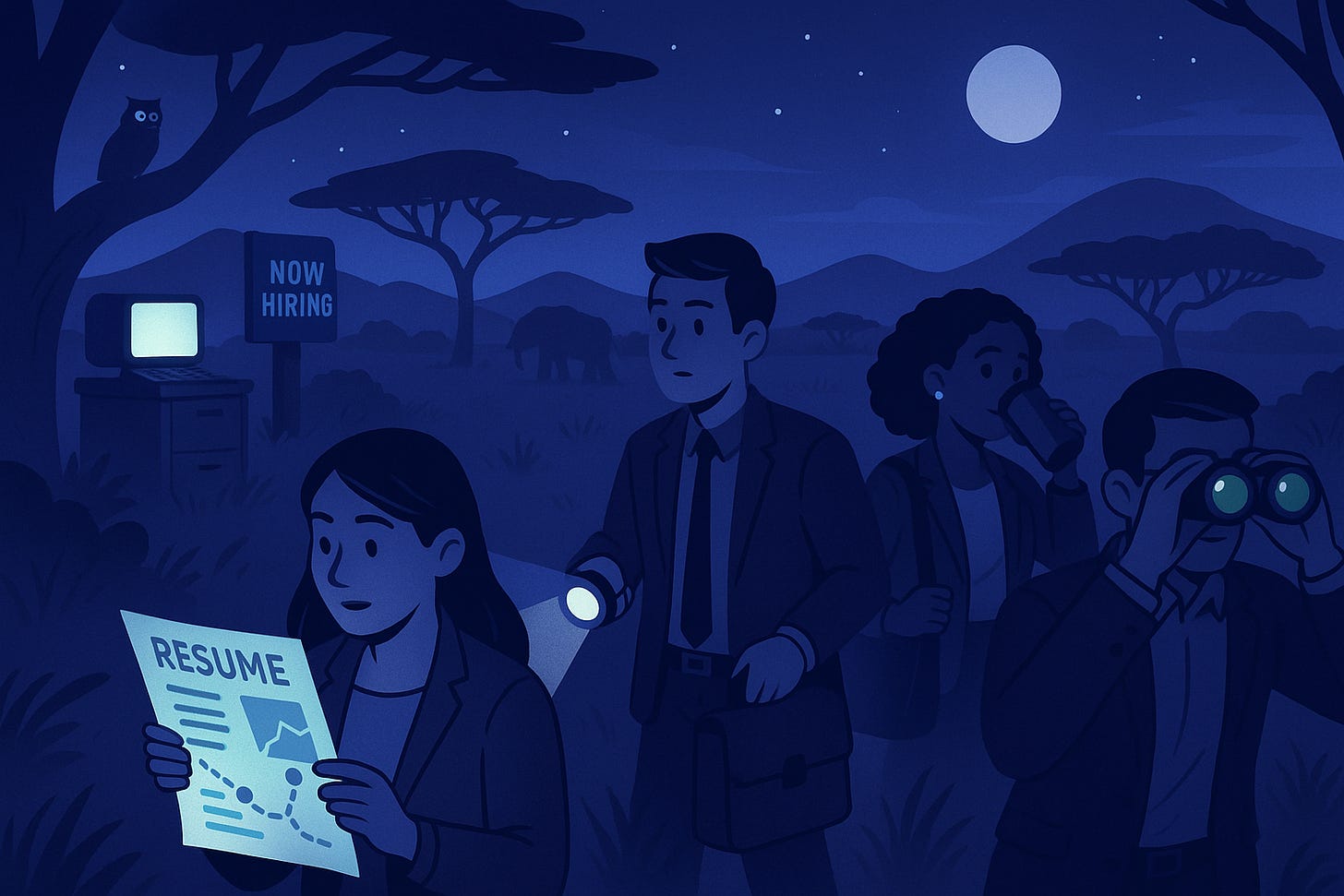Many times people take to job searching with a transactional and predatory mindset, a "job hunt." I think that approach leaves little room for exploration or finding the right fit. It's time to reimagine the job search as a transformative journey, a path we travel together, an adventure we choose to embark upon. Let's go on a JOB SAFARI!
Give Up The Hunt:
"Stephen, it's just a term, 'job hunt', who cares?"
While it may seem like a slight linguistic shift, our words shape how we think1.
In a hunt, the prey often meets its demise. Hopefully, you’re not going postal in your new job, right? Is that the relationship you hope to have with your work?
"Job hunt" conveys an approach of cunning as if one is trying to sneak up on potential employers. This perspective can lead people to focus solely on "the right thing to say," rather than genuinely assessing if a job aligns with their skills and goals.
The job hunt mentality reminds me of grandparent advice for looking for a job, “Knock on every door in town until someone hires you.” That's why I think my grandpa was a carpet salesman, cook, cop, basketball coach, and like 15 other jobs, like he was a one-man The Busy World of Richard Scarry.
Any Millennial or Gen-Zer would say, "No, no, that's not how we find jobs." But I've read several LinkedIn posts of people saying they have applied for hundreds of jobs. So maybe Grandpa was just early to the LinkedIn hustle?
Embracing the Journey, Not Longing for the Destination
In Swahili, the word "safari" translates to journey2, capturing the essence of what the job search should be: an adventure of self-discovery. Rather than solely focusing on the end goal, a job safari emphasizes the value of the process itself. When we approach interviews and other work-life conversations as opportunities for learning and growth, we embrace the chance to expand what is possible for us in the working world.
The transactional job hunt leads to thin conversations, "Do you have a job for me?" And, "Did I get it?"
The job safari opens up to, "What job is for me?" And, "Do I want it?"
These introspective questions become more critical as time passes. People often feel unfulfilled at work (my treatise here), but I don't think they spend as much time asking themselves, "What would fulfill me at work?"
If You Want To Go Fast, Go Alone. If You Want To Go Far, Go Together.
A hunt feels lonely, in the mud, covered in deer piss, waiting quietly. A safari is an excursion with friends, to see new sights, enjoyed with weird characters you meet along the way.
Taking the time on your safari to get close and patiently observe careers gives you more perspective. Talk to your friend about their work problem, and don't try to solve it, but understand it. Ask a mentor if you can help with the boring parts of a project. Take on a task you don't know how to do with someone who does.
On a job safari, we seek the right fit for us and recognize the importance of releasing ill-suited opportunities. Instead of finding a job is wrong for you, turning it down, and going on with your day - step back and think, "Could this be right for anyone I know?" With this, we can foster relationships that thrive on sharing information and allow us to contribute to the success of others.
That’s not just generous and going to make you feel warm and fuzzy, it’s strategic.
Through collaboration, we transform the job search from a competitive race into a cooperative journey, where success is not measured by individual victories but by collective growth. If "your net worth is your network" is true, you also want your network to succeed.
Choose to Live with an Engaging Career
I got set up to talk to a young man a year ago, and he was adamant that he wanted a job with my company. I was surprised. He was direct in that ask. And I said, in what department at my company, what do you want to do? His answer was “anything.” He loved what I did, what my colleagues did, what my company did, who we worked with. All of it.
He said the right things - he loved my company and what I did. But he was a terrible fit. But not only that, I don't think I helped him, or he helped me. He was hunting. Managers who care weed those people out.
(Side note: Imagine if that guy had actually prepped and come with real questions, that could’ve been a relationship instead of a rejection.)
So don't just get the job. Live with a job you're ready to be engaged in, that you want to be engaged in.
I had another conversation a couple of weeks back where a friend was preparing for a final job interview. They were talking to me, trying to do what the other guy was doing - find the right things to say. I said you're super qualified for this job. You know a lot about this industry. Go into the interview, and don't worry about getting the words right. Go in and talk to this person about what they do, what you do, how what they do and you do are similar, ways they're different, and why they're different. Having a meaningful, engaging conversation about the work is wildly more confidence-inspiring for a hiring manager than executing overwrought advice like at the end of the interview, asking, "What are the KPIs for this role?" (every kid on TikTok asks that, few professionals do.)
When you find the right job, you'll be deeply engaged and ready to go in and get the job.
Transitioning to a Job Safari
Of course, sometimes, we are in survival mode. We don't have time to delve into the realities of the opportunities that come along, we simply need to eat. And if that's where you're at, then hunt away, by all means. There's no shame in that; I've done the same.
Are you hunting right now? Will you take anything? Great. Eat.
And after the hunt, when you're stable, will you be ready to go on job safari?
This is a real, documented thing and quite interesting. In summary, languages that connect the future and the present grammatically tend to promote future-oriented behavior. People who speak these languages save more, have greater wealth in retirement, smoke less, practice safer sex, and are less obese.https://papers.ssrn.com/sol3/papers.cfm?abstract_id=1914379
Or so I read on Wikipedia: https://en.wikipedia.org/wiki/Safari








This is a great piece, Stephen. It fits with a lot of the podcasts I've been listening to about regenerative business practices. Best yet, your words have inspired me to write my next piece on how to stop shopping for the perfect vacation. For that, I am very grateful!